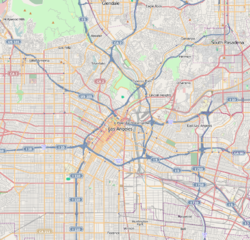| Los Angeles Center Studios | |
|---|---|
| Former names | Union Oil Center |
| General information | |
| Location | 450 South Bixel Street Los Angeles, California 90017 |
| Coordinates | 34°03′19″N118°15′40″W / 34.055393°N 118.26109°W |
| Groundbreaking | 1955 |
| Completed | April 1958 |
| Design and construction | |
| Architect | William Pereira |
| Architecture firm | Pereira & Luckman |
| Main contractor | Del E. Webb Construction Company |
Los Angeles Center Studios is a 20-acre film production studio located in the City West neighborhood of Los Angeles, California, United States. [1]
